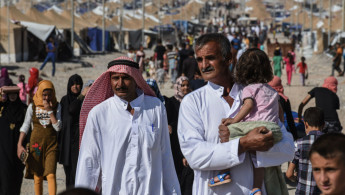Two million displaced Iraqis return to their liberated home cities
"Two million of the five million displaced since Daesh took over the north and west of the country in early 2014, have returned to their liberated cities," a Ministry of Immigration statement said, using the Arabic acronym for IS.
Some 2.9 million of the total number of displaced are residents of Mosul, Iraq's second largest city and until recently, a former IS-bastion.
"But more than 2 million are still in camps," the statement said, noting that "the proportion of those that have returned to their liberated areas in Mosul has reached 27 percent so far".
The statement comes on the eve of a resolution issued by the Iraqi Parliament obliging Prime Minister Haider Abadi to arrange the return of residents to the liberated areas of Nineveh within a maximum one month period.
"In view of the liberation of the land from the terrorist gangs, the Commander-in-Chief of the Armed Forces has to instruct the joint operations and all factions of the Popular Mobilisation Forces to allow and not to object to the return of the displaced people of al-Baaj and its villages within a period of one month," the law states.
The decision coincided with a fresh wave of displacement from the city of Tal Afar west of Mosul, where Iraqi forces made early gains in a battle that began on Sunday.
Five villages around the Islamic State group-held town of Tal Afar were captured on Monday, in a major offensive on one of the militants' last strongholds in Iraq.
The Iraqi army seized control of Tal Rihal, Jabbara, Hussein Idris, al-Mulla and al-Majeed villages, said Lt. Gen. Abdul Amir Yarallah from the Joint Operations Command in a statement.
It is thought that around 2,000 IS militants are positioned in the town, which has been one of the extremists' most important strongholds in Niniveh province, northern Iraq.
Since the fall of Mosul last month, Tal Afar became one of the last major urban areas in Iraq still under IS control.
An Iraqi army counter-offensive against IS in northern Iraq has led to hundreds of thousands of displaced, as mostly Sunni civilians flee air raids, shelling, and reprisals.
IS has also used civilians as human shields to slow the advance of the army.
Further displacement
The United Nations warned on Sunday that an escalation in violence around Tal Afar will lead to further displacement of people in the area.
UN Humanitarian Coordinator for Iraq, Lise Grande, said that the "very tough" situation in Tal Afar, where food and water is scarce, has already caused over 30,000 people to flee.
The presence of Hashd al-Shaabi (Popular Mobilisation Forces) militias - who have been accused of preventing residents from returning - in the assault has also caused concern among human rights groups about potential reprisals by fighters against civilians and captives.
Analysts considered that "the decision of the parliament is binding on the Prime Minister, but factions of the crowd are not subject neither to the authority of Abadi nor to the decisions of parliament."
"This decision came late," said political analyst Abdul Majeed al-Zubaidi. "There are large areas where displaced people were not allowed to return to, including the Al-Sakhr cliff south of Baghdad, the town of Baiji in Salah al-Din and other areas in the border province of Diyala with Iran."
"The main problem is that the popular militias do not abide by the decisions of the parliament or the orders of the prime minister, which means the continued displacement of thousands of civilians who are not allowed to return to their liberated cities," Zubaidi said.



